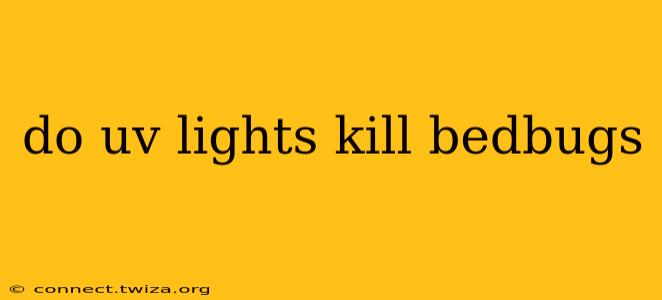Do UV Lights Kill Bed Bugs? The Truth About UV Light and Bed Bug Infestations
The question of whether UV lights kill bed bugs is a common one, fueled by the desire for a quick, easy solution to a frustrating pest problem. While UV light, specifically ultraviolet-C (UVC) light, has proven effective against some microorganisms, its efficacy against bed bugs is less clear-cut and often overstated. Let's delve into the science and separate fact from fiction.
Do UV lights kill bed bugs instantly?
No, UV lights do not kill bed bugs instantly. While UVC light can damage the DNA of some organisms, leading to their death, bed bugs have a relatively robust exoskeleton that offers some protection. Exposure to UVC light might harm some bed bugs, but it's unlikely to be a rapid or complete eradication method.
Can UV light be used as a primary bed bug treatment?
No, UV light should not be considered a primary treatment for a bed bug infestation. It's more accurate to consider it a supplementary measure at best, and even then, its effectiveness is debated among pest control professionals. Relying solely on UV light to eliminate bed bugs is highly unlikely to succeed.
What are the limitations of using UV lights to kill bed bugs?
Several factors limit the effectiveness of UV light against bed bugs:
- Limited penetration: UVC light doesn't penetrate surfaces effectively. Bed bugs often hide in cracks and crevices, making it difficult for the light to reach them.
- Uneven exposure: To be effective, bed bugs need prolonged exposure to UVC light. Achieving this uniformly across an entire infested area is practically impossible.
- Resistance: While not extensively studied, there's potential for bed bugs to develop resistance to UVC light over time, much like some insects develop resistance to insecticides.
- Safety concerns: UVC light is harmful to human skin and eyes. Improper use can lead to serious health consequences. Professional-grade equipment with safety features is necessary.
What are more effective methods for bed bug control?
The most effective methods for bed bug control involve a multi-pronged approach typically implemented by professional pest control services:
- Heat treatment: High temperatures effectively kill bed bugs and their eggs.
- Chemical treatments: Insecticides, when applied correctly by professionals, target bed bugs and their breeding sites.
- Steam treatment: High-pressure steam can effectively kill bed bugs in infested areas.
- Vacuuming: Thorough vacuuming helps remove bed bugs and their eggs from surfaces.
- Encasements: Protective mattress and box spring encasements prevent bed bugs from accessing these harborages.
Can UV lights be used in combination with other bed bug treatments?
While UVC light is unlikely to provide significant standalone benefits in bed bug control, it might be a secondary measure in conjunction with other methods. For example, after a heat treatment or insecticide application, UVC light could potentially kill any surviving bed bugs exposed to the light. However, this is highly speculative and not a proven effective strategy.
In conclusion, while UV light might kill some bed bugs under specific, controlled conditions, it's not a reliable or efficient method for eradicating a bed bug infestation. It's crucial to rely on proven and professional pest control methods for effective and safe bed bug extermination. Don't waste your time and money on UV light as a primary solution; instead, contact a qualified pest control professional for a comprehensive and effective treatment plan.
